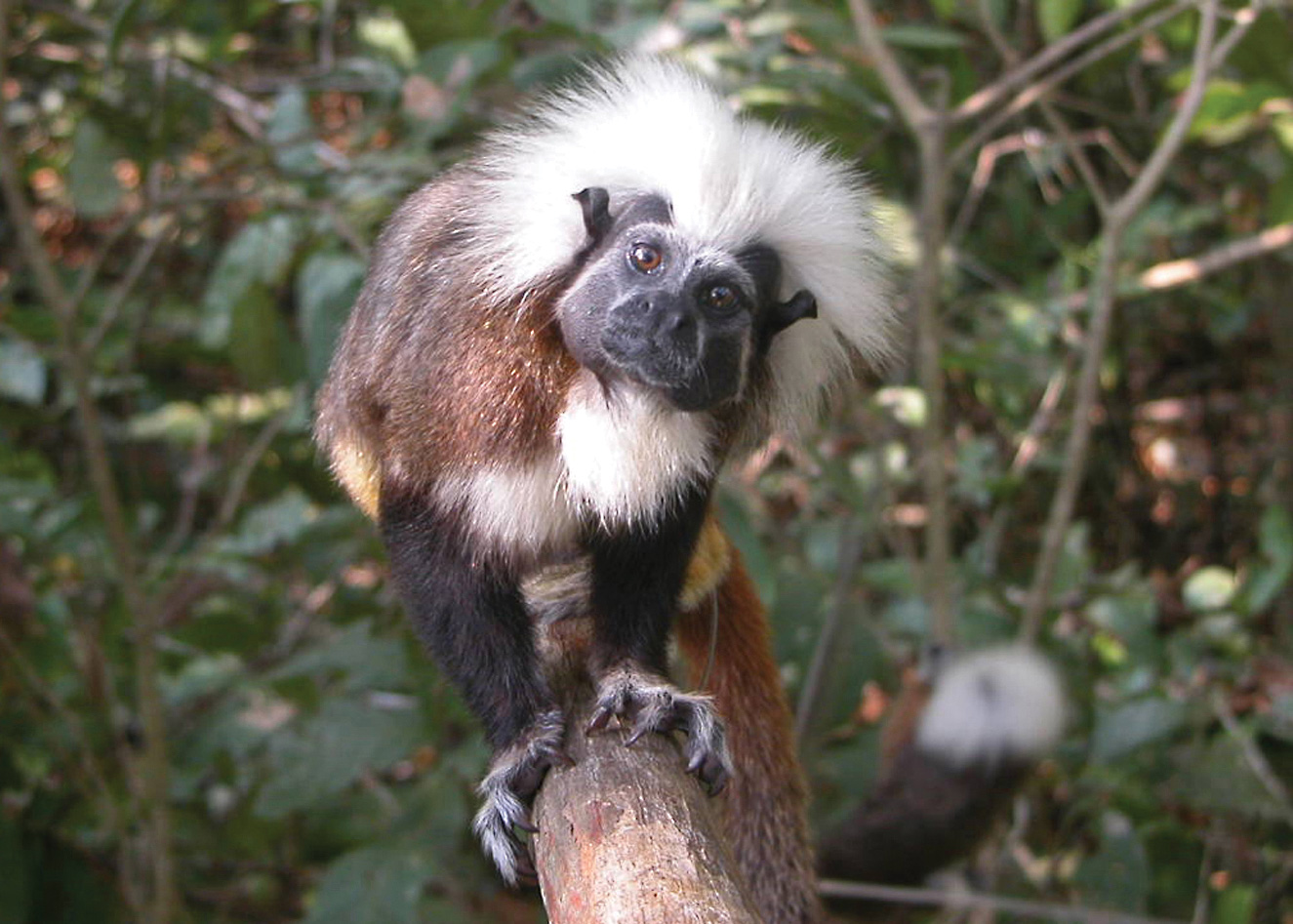Totebags from Trash Help Turtles and Tamarins
International sales of eco-mochilas help these artisans generate income to support their families. © Proyecto Tití
By Anne Savage, Iader Lamilla, and Rosamira Guillen
Pollution and poverty are among the greatest challenges to development of effective conservation programs for endangered species. As human populations have increased, the number of plastic bags that litter the landscape has also grown, creating a serious threat to wildlife on land and at sea. We have created a model program in Colombia called Proyecto Tití that alleviates the threats posed by plastic bags, while empowering women in rural communities by teaching them practical skills that help generate income for their families. When human needs are met through stable incomes, rural communities are better able to help protect wildlife for the future.
A small charismatic monkey, the endemic cotton-top tamarin (Saguinus oedipus), locally referred to as mono tití cabeciblanco, serves as the flagship species for Proyecto Tití. In communities near its native habitat in northern Colombia, we have built a network of artisans (ASO ARTES ANAS) who collect plastic bags before they enter the waste stream. The artisans use this raw material to crochet eco-mochilas, beautiful tote bags made from plastic that would otherwise be littering the environment. The proceeds from the sale of eco-mochilas—now sold worldwide—go to the local communities where they are produced and support long-term programs to protect cotton-top tamarins in Colombia.
Exposure to and ingestion of plastic bags is not only a problem for terrestrial wildlife in Colombia, but also a major hazard for sea turtles. When sea turtles eat plastic bags, they can develop intestinal blockages as well as suffer poisoning by chemicals that leach from the plastics. Thus, efforts to reduce the amount of waste in our oceans are essential. Proyecto Tití established a partnership with the Wider Caribbean Sea Turtle Conservation Network (WIDE CAST) in order to host a training session with local artisans from coastal areas of Costa Rica, Nicaragua, and Panama to teach the techniques used in making eco-mochilas with recycled plastic bags. This initiative has resulted in a trained group of women who produce products for sale both to local tourists who are visiting sea turtle nesting beaches, as well as to international markets.
With this simple idea, we have already recycled more than two million plastic bags in Colombia alone, and we provide jobs to more than 300 women in rural communities. The positive results achieved through this waste-reduction initiative, the entrepreneurial spirit evoked in rural communities with scarce economic options, and the renewed interest in conservation by rural stakeholders make this program an excellent candidate for replication wherever one finds plastic waste and communities in need of economic advancement. Other people in Bangladesh, Brazil, Ecuador, Sri Lanka, and the United Kingdom have been similarly inspired to form cooperatives that empower women, increase local incomes, and engage rural communities in conservation by creating small-scale industries that produce environmentally friendly goods. Some groups, such as U.K.-based Turtle Bags (www.turtlebags.co.uk), use sea turtles as a logo and iconic reminder of why it is important to reduce plastic pollution. Another effort, spearheaded by Projeto TAMAR in Brazil (see SWOT Report, Vol. 4, page 35), has developed a full-scale retail business that sells locally produced crafts to generate income directly supporting sea turtle conservation efforts in that country.
Initiatives such as Proyecto Tití that create environmental entrepreneurs in impoverished rural communities have been shown to generate tangible economic returns. These initiatives have longlasting, positive conservation returns by providing alternatives to hunting, poaching, or activities that exploit wildlife. Perhaps most important, they foster a conservation ethic for future generations by demonstrating how environmentally friendly industries, such as the production of eco-mochilas, are both profitable and good for nature.
Eco-mochila artisans collect old plastic bags before they can cause harm to wildlife. © Proyecto Tití
Made from 100-120 plastic bags each, eco-mochilas have kept more than two million plastic bags from entering Columbia’s waste stream. © Proyecto Tití
Increasing plastic debris threatens Proyecto Tití’s flagship species, the cotton-top tamarin (Saguinus oedipus), as well as sea turtles. © Proyecto Tití
For more information on Proyecto Tití, visit www.proyectotiti. com, or see the following publication: Savage, A., R. Guillen, I. Lamilla, and L. Soto. 2009. Developing an effective community conservation program for cotton-top tamarins (Saguinus oedipus) in Colombia. American Journal of Primatology 71: 1–12.
This article originally appeared in SWOT Report, vol. 5 (2010). Click here to download the entire article as a PDF.




